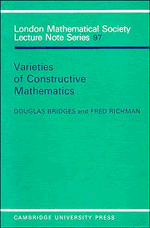Preface
Published online by Cambridge University Press: 04 April 2011
Summary
In Hilary Term, 1981, Douglas Bridges gave a course of lectures on Intuitionism and constructive mathematics in the Mathematical Institute of Oxford University. Shortly afterwards, he invited Fred Richman to join in the writing of a book based (as it turns out, rather loosely) on those lectures. The book now lies in front of the reader, as an introduction to the spirit and practice of modern constructive mathematics.
There are several excellent works – such as Beeson's Foundations of Constructive Mathematics and Dummett's Elements of Intuitionism – on the logical and philosophical foundations of constructive mathematics; and there are others, such as Bishop's seminal treatise Foundations of Constructive Analysis, dealing with the detailed development of major portions of mathematics within a constructive framework. The present book is intended to land between those two positions: specifically, we hope that, with a minimum of philosophy and formal logic, and without requiring of the reader too great an investment of time and effort over technical details, it will leave him with a clear conception of the problems and methods of the three most important varieties of modern constructive mathematics.
- Type
- Chapter
- Information
- Varieties of Constructive Mathematics , pp. v - viiiPublisher: Cambridge University PressPrint publication year: 1987

